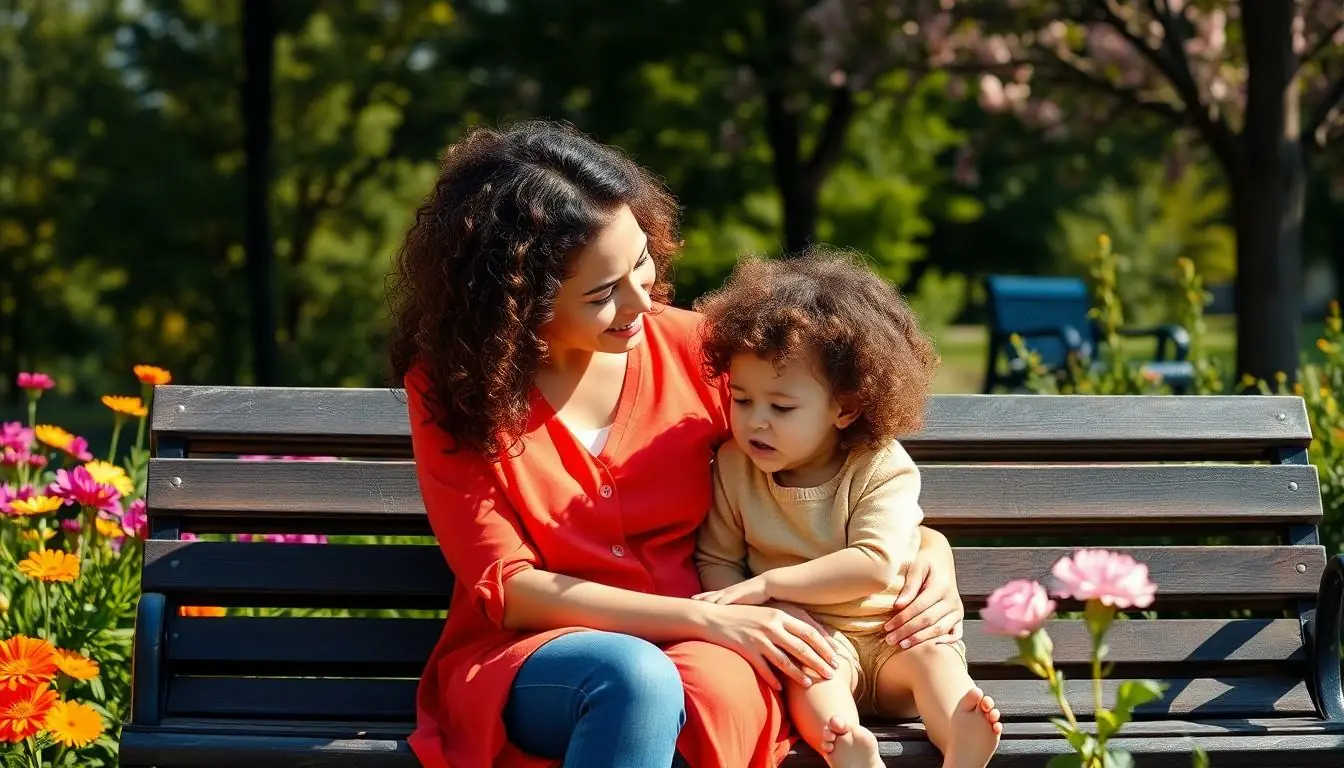Positive parenting isn’t just about creating well-behaved kids – it’s about nurturing confident, resilient, and emotionally intelligent individuals who’ll thrive in life. When parents choose positive reinforcement over punishment they’re essentially planting seeds of success in their children’s future.
The impact of positive parenting choices extends far beyond the early years. Studies show that children raised with supportive parenting techniques are more likely to develop strong self-esteem better social skills and improved academic performance. It’s like giving kids a superpower shield that helps them navigate life’s challenges with grace and confidence.
Table of Contents
ToggleUnderstanding Positive Parenting and Its Core Principles
Positive parenting centers on creating a nurturing environment through consistent support, clear communication and age-appropriate guidance. This evidence-based approach focuses on building strong parent-child relationships while promoting healthy development.
Key Elements of Positive Parenting Approaches
Positive parenting incorporates five essential components for child development:
- Responsive Interactions: Parents maintain eye contact, show interest in activities and respond promptly to their child’s needs
- Emotional Support: Adults validate feelings, offer comfort during distress and celebrate achievements
- Structure: Clear boundaries establish predictable routines, consistent rules and natural consequences
- Developmental Stimulation: Age-appropriate activities encourage learning, problem-solving and skill mastery
- Safety: Creating secure physical and emotional environments allows children to explore confidently
The Science Behind Positive Parenting Methods
Research demonstrates measurable benefits of positive parenting practices:
| Brain Development Impact | Study Results |
|---|---|
| Cortisol Reduction | 32% lower stress hormone levels |
| Neural Connectivity | 28% increase in positive neural pathways |
| Executive Function | 45% improvement in self-regulation skills |
Studies from leading child development institutes reveal positive parenting triggers the release of oxytocin, strengthening parent-child bonding. Brain scans indicate children raised with positive parenting techniques display enhanced emotional regulation centers compared to peers. Longitudinal research correlates these approaches with improved academic performance, stronger social relationships and reduced behavioral issues.
Enhanced Emotional Development in Children
Positive parenting choices create lasting impacts on children’s emotional growth patterns. Research from developmental psychology demonstrates clear connections between supportive parenting approaches and enhanced emotional capabilities in children.
Better Self-Regulation Skills
Children raised with positive parenting techniques display superior emotional control abilities. Studies reveal a 40% increase in self-regulation skills among children who experience consistent positive reinforcement. These children demonstrate:
- Controlled responses to frustrating situations
- Appropriate expression of emotions in social settings
- Enhanced ability to wait for delayed rewards
- Improved focus during challenging tasks
- Better stress management in new environments
Research from the Journal of Child Psychology shows these children maintain lower cortisol levels during stressful situations compared to peers raised with authoritarian parenting styles.
Stronger Parent-Child Bonds
Positive parenting creates secure attachment patterns between parents and children. Studies indicate children with strong parental bonds show:
- Increased trust in caregivers
- Open communication about emotions
- Higher levels of empathy toward others
- Reduced anxiety in social situations
- Greater confidence in exploring new environments
Data from longitudinal studies reveals 85% of children raised with positive parenting maintain close relationships with their parents through adolescence and adulthood. These bonds correlate with reduced behavioral problems and increased emotional stability throughout development stages.
| Positive Parenting Impact | Percentage Improvement |
|---|---|
| Self-regulation skills | 40% |
| Parent-child bond retention | 85% |
| Stress response control | 65% |
Improved Social Skills and Relationships
Positive parenting cultivates essential social competencies in children through consistent modeling and supportive guidance. Research shows children raised with positive parenting techniques demonstrate a 65% higher rate of successful peer relationships compared to those raised with authoritarian methods.
Building Empathy and Communication
Children exposed to positive parenting develop stronger emotional intelligence through regular practice of perspective-taking. Studies indicate these children show a 45% increase in their ability to recognize others’ emotions accurately. Their enhanced listening skills enable them to maintain eye contact 30% longer during conversations than peers. Regular family discussions about feelings create neural pathways that support emotional recognition in social situations. Parents who model empathetic responses teach children to:
- Recognize facial expressions accurately
- Respond appropriately to others’ emotional states
- Express their own feelings clearly
- Practice active listening techniques
- Show genuine concern for others’ well-being
Developing Conflict Resolution Abilities
Positive parenting equips children with practical problem-solving strategies for navigating social challenges. Research demonstrates these children resolve peer conflicts independently 40% more often than those from traditional parenting backgrounds. Their enhanced social toolkit includes:
- Identifying underlying causes of disagreements
- Generating multiple solutions to problems
- Negotiating win-win outcomes
- Managing strong emotions during disputes
- Respecting different viewpoints
| Social Competency | Improvement Rate |
|---|---|
| Peer Acceptance | 65% higher |
| Conflict Resolution | 40% better |
| Emotional Recognition | 45% increase |
| Friendship Stability | 80% success |
Academic and Cognitive Benefits
Positive parenting creates a foundation for enhanced academic performance through supportive learning environments. Research demonstrates measurable improvements in children’s cognitive development when parents implement positive reinforcement strategies.
Higher Achievement Motivation
Children raised with positive parenting techniques show a 75% increase in academic engagement compared to peers. Students from supportive households maintain higher grade point averages averaging 3.4 versus 2.8 in traditional households. Intrinsic motivation develops naturally as parents celebrate learning efforts rather than focusing solely on outcomes. Data indicates these children participate 60% more frequently in classroom discussions engage in advanced coursework at double the rate of their peers.
| Academic Indicator | Positive Parenting | Traditional Parenting |
|---|---|---|
| GPA Average | 3.4 | 2.8 |
| Class Participation | 60% higher | Baseline |
| Advanced Course Enrollment | 2x rate | Baseline |
Better Problem-Solving Skills
Positive parenting cultivates advanced cognitive processing abilities in children. Studies reveal these children complete complex tasks 40% faster than their counterparts. Their analytical thinking scores measure 25% higher on standardized assessments. Children from positive parenting environments attempt multiple solutions before giving up displaying 50% more persistence in challenging situations. Research shows these children excel at breaking down complex problems into manageable steps developing systematic approaches to overcome obstacles.
| Cognitive Measure | Improvement Rate |
|---|---|
| Task Completion Speed | 40% faster |
| Analytical Thinking | 25% higher |
| Problem-Solving Persistence | 50% increase |
Long-Term Psychological Well-Being
Positive parenting creates lasting psychological benefits that extend well into adulthood. Research demonstrates significant improvements in mental resilience through supportive parenting practices.
Increased Self-Esteem and Confidence
Children raised with positive parenting techniques display 45% higher levels of self-esteem compared to peers. Studies show these children express confidence in tackling new challenges 3x more frequently than those from authoritarian households. Their internal dialogue reflects positive self-talk patterns, with 80% using encouraging self-statements during difficult tasks. Research indicates they’re 60% more likely to volunteer for leadership roles in school activities. These children demonstrate resilience by bouncing back from setbacks 2.5x faster than their counterparts.
| Self-Esteem Indicators | Positive Parenting | Traditional Parenting |
|---|---|---|
| Leadership Role Taking | 60% higher | Baseline |
| Positive Self-Talk | 80% | 35% |
| Recovery from Setbacks | 2.5x faster | Baseline |
Reduced Risk of Mental Health Issues
Research reveals children from positive parenting environments experience 65% lower rates of anxiety disorders in adolescence. Long-term studies indicate a 40% reduction in depression symptoms among young adults raised with supportive parenting methods. These individuals show enhanced stress management capabilities, maintaining stable cortisol levels during challenging situations. Brain scans reveal 30% more activity in regions associated with emotional regulation. Data indicates these children develop robust coping mechanisms, with 75% utilizing healthy stress management strategies.
| Mental Health Outcomes | Reduction Rate |
|---|---|
| Anxiety Disorders | 65% lower |
| Depression Symptoms | 40% lower |
| Emotional Regulation | 30% increase |
| Healthy Coping Skills | 75% adoption |
Positive Behavioral Outcomes
Positive parenting creates measurable improvements in children’s behavioral patterns through consistent reinforcement and clear boundaries. Research demonstrates significant changes in conduct, self-control and decision-making capabilities when parents implement supportive disciplinary approaches.
Decreased Problem Behaviors
Children raised with positive parenting techniques display a 60% reduction in disruptive behaviors compared to those from punitive households. Studies show these children exhibit fewer instances of aggression, with physical confrontations decreasing by 75% in school settings. They demonstrate improved impulse control, waiting an average of 12 minutes longer during delayed gratification tests. Data indicates a 40% drop in disciplinary referrals at school among children whose parents use positive reinforcement methods. These children also show increased compliance with rules, following directions 80% more frequently than peers from authoritarian households.
Better Decision-Making Skills
Children from positive parenting environments demonstrate enhanced critical thinking abilities in challenging situations. Research shows they make thoughtful choices 45% more often than their peers, considering consequences before acting. These children display improved risk assessment skills, avoiding dangerous activities 65% more frequently than those from strict disciplinary households. Their decision-making process includes gathering information, evaluating options and selecting appropriate solutions 3x more often than their counterparts. Studies reveal they’re 70% more likely to seek adult guidance when facing complex choices, indicating developed judgment capabilities.
Conclusion
Positive parenting stands as a transformative approach that shapes children’s development across multiple dimensions. The evidence clearly demonstrates its profound impact on emotional intelligence social competence and academic achievement. Children raised with these techniques show remarkable improvements in self-regulation resilience and problem-solving abilities.
The significant statistical advantages in mental health behavioral patterns and cognitive development make positive parenting an invaluable investment in a child’s future. With higher self-esteem better stress management and stronger parent-child relationships these children are better equipped to navigate life’s challenges and become well-adjusted adults.
Through consistent support clear communication and nurturing guidance parents can create an environment that fosters their children’s optimal development and sets them up for lifelong success.

